Henslin James M. Sociology: A Down to Earth Approach
Подождите немного. Документ загружается.

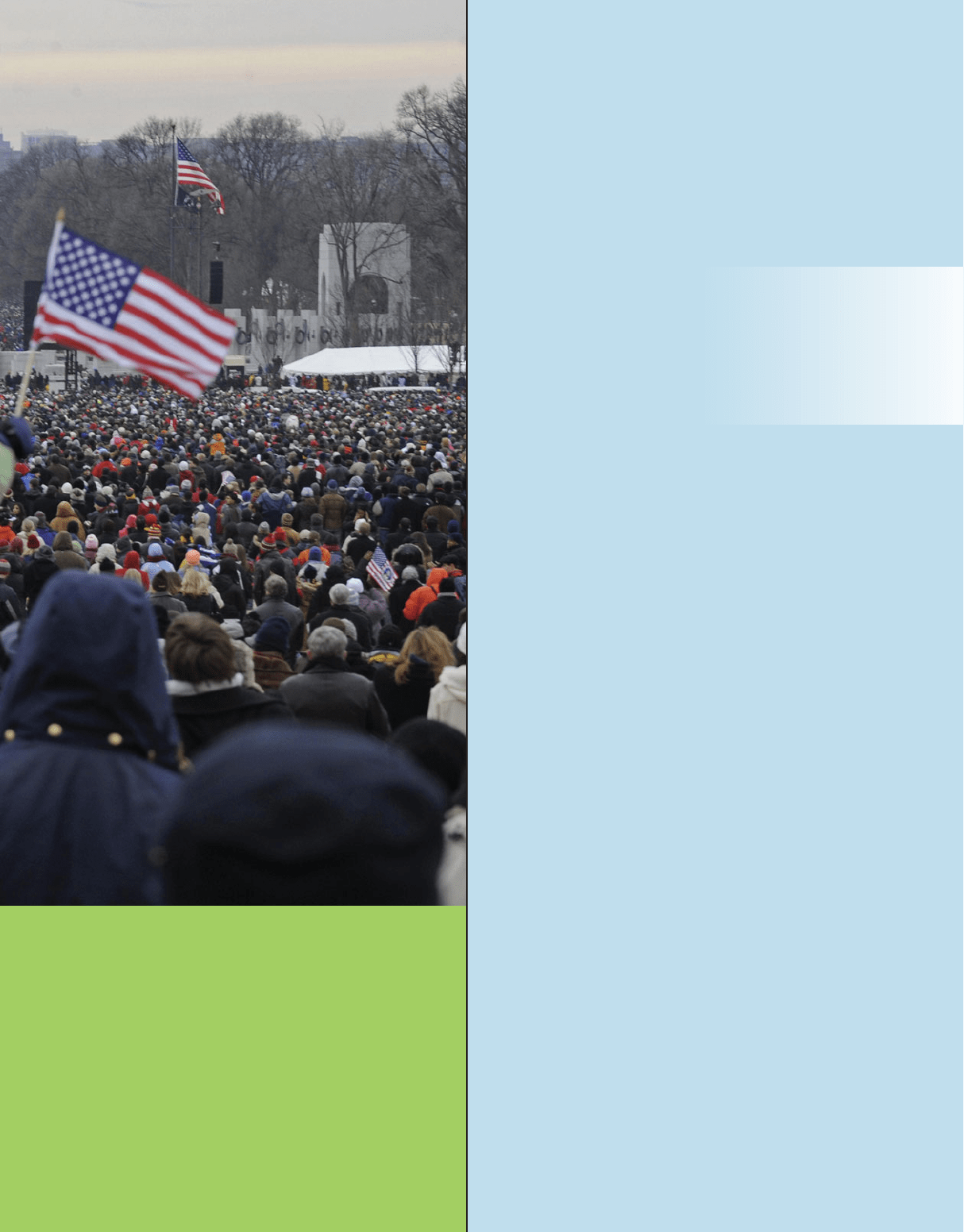
n 1949, George Orwell wrote 1984, a book
about a time in the future in which the government,
known as “Big Brother,” dominates society, dictating almost
every aspect of each individual’s life. Even loving someone is considered
sinister—a betrayal of the supreme love and total allegiance that all
citizens owe Big Brother.
Despite the danger,
Winston and Julia fall in love.
They delight in each other,
but they must meet furtively,
always with the threat of dis-
covery hanging over their
heads. When informers turn
them in, interrogators separate Julia and Winston and try to
destroy their affection and restore their loyalty to Big Brother.
Winston’s tormentor is O’Brien, who straps Winston into a
chair so tightly that he can’t even move his head. O’Brien explains
that inflicting pain is not always enough to break a person’s will,
but everyone has a breaking point. There is some worst fear that
will push anyone over the edge.
O’Brien tells Winston that he has discovered his worst fear.
Then he sets a cage with two starving giant sewer rats on the table
next to Winston. O’Brien picks up a hood connected to the door of
the cage and places it over Winston’s head. He then explains that
when he presses the lever, the door of the cage will slide up, and the
rats will shoot out like bullets and bore straight into Winston’s face.
Winston’s eyes, the only part of his body that he can move, dart back
and forth, revealing his terror. Speaking so quietly that Winston has
to strain to hear him, O’Brien adds that the rats sometimes attack the
eyes first, but sometimes they burrow through the cheeks and devour
the tongue. When O’Brien places his hand on the lever, Winston re-
alizes that the only way out is for someone else to take his place. But
who? Then he hears his own voice screaming, “Do it to Julia! . . .
Tear her face off. Strip her to the bones. Not me! Julia! Not me!”
Orwell does not describe Julia’s interrogation, but when Julia
and Winston see each other later, they realize that each has betrayed
the other. Their love is gone. Big Brother has won.
Winston’s and Julia’s misplaced loyalty had made them politi-
cal heretics, a danger to the state, for every citizen had the duty to
place the state above all else in life. To preserve the state’s domi-
nance over the individual, their allegiance to one another had to be
stripped from them. As you see, it was.
Although seldom this dramatic, politics is always about power and
authority. Let’s explore this topic that is so significant for our lives.
I
Even loving someone is
considered sinister—a be-
trayal of the supreme love
and total allegiance that all
citizens owe Big Brother.
431
Washington, D.C.
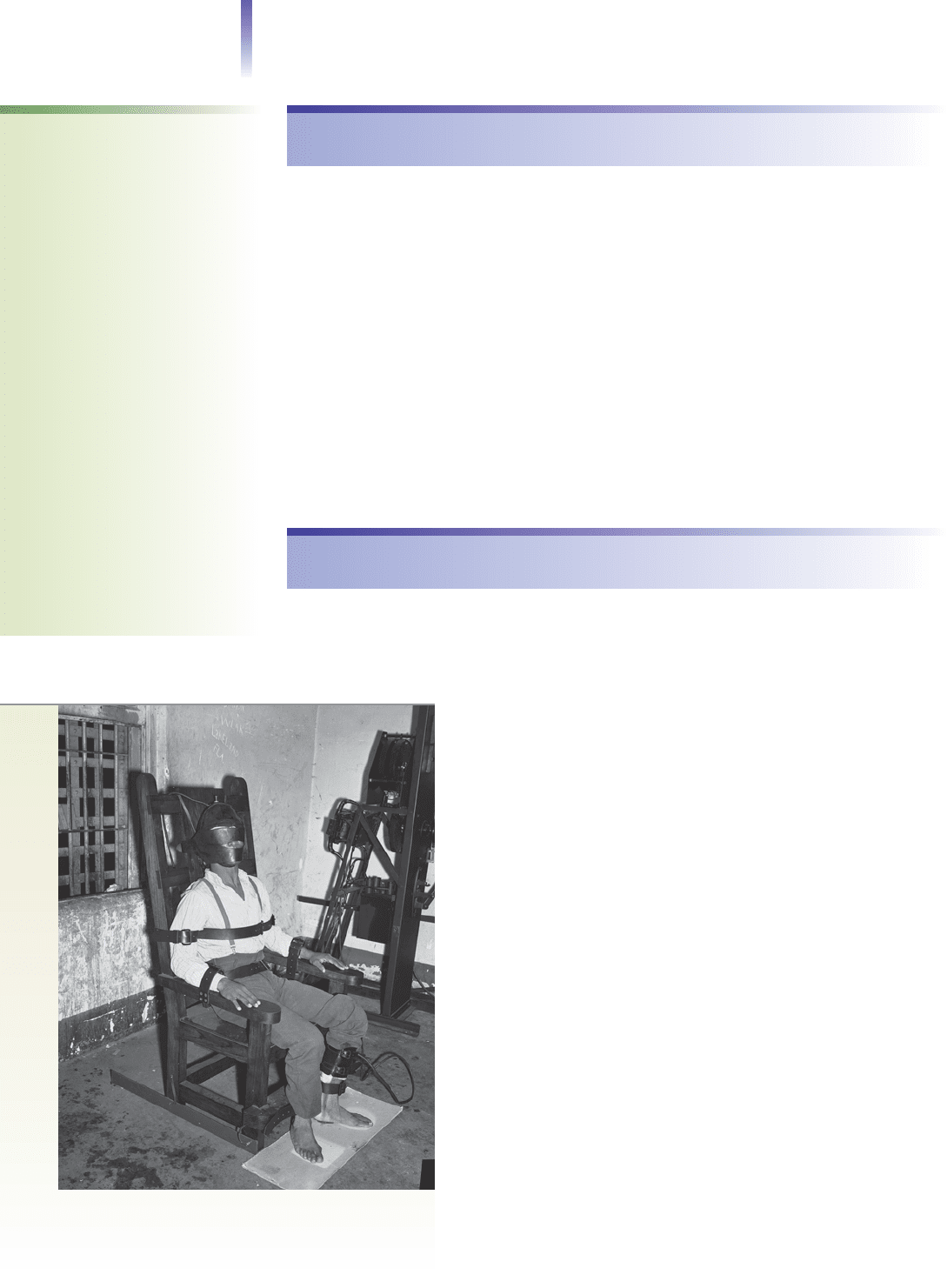
Micropolitics and Macropolitics
The images that come to mind when we think of politics are associated with government:
kings, queens, coups, dictatorships, people running for office, voting. These are exam-
ples of politics, but the term actually has a much broader meaning. Politics refers to power
relations wherever they exist, including those in everyday life. As Weber (1922/1978) said,
power is the ability to get your way even over the resistance of others. You can see the
struggle for power all around you. When workers try to gain the favor of their bosses,
they are attempting to maneuver into a stronger position. Students do the same with their
teachers. Power struggles are also part of family life, such as when parents try to enforce
a curfew over the protests of a reluctant daughter or son. Ever have a struggle over the re-
mote control to the TV? All these examples illustrate attempts to gain power—and, thus,
are political actions. Every group, then, is political, for in every group there is a power strug-
gle of some sort. Symbolic interactionists use the term micropolitics to refer to the exer-
cise of power in everyday life (Schwartz 1990).
In contrast, macropolitics—the focus of this chapter—refers to the exercise of power
over a large group. Governments—whether dictatorships or democracies—are examples
of macropolitics. Because authority is essential to macropolitics, let’s begin with this topic.
Power, Authority, and Violence
To exist, every society must have a system of leadership. Some people must have power over
others. As Max Weber (1913/1947) pointed out, we perceive power as either legitimate or
illegitimate. Legitimate power is called authority. This is power that people accept as right.
In contrast, illegitimate power—called coercion—is power that people do not accept as just.
Imagine that you are on your way to buy the hot new cell phone
that is on sale for $250. As you approach the store, a man jumps
out of an alley and shoves a gun in your face. He demands your
money. Frightened for your life, you hand over your $250. After fil-
ing a police report, you head back to college to take a sociology
exam. You are running late, so you step on the gas. As you hit 85,
you see flashing blue and red lights in your rearview mirror. Your
explanation about the robbery doesn’t faze the officer—or the judge
who hears your case a few weeks later. She first lectures you on safety
and then orders you to pay $50 in court costs plus $10 for every
mile over 65. You pay the $250.
The mugger, the police officer, and the judge—all have power,
and in each case you part with $250. What, then, is the difference?
The difference is that the mugger has no authority. His power is
illegitimate —he has no right to do what he did. In contrast, you ac-
knowledge that the officer has the right to stop you and that the judge
has the right to fine you. They have authority, or legitimate power.
Authority and Legitimate Violence
As sociologist Peter Berger observed, it makes little difference
whether you willingly pay the fine that the judge levies against you
or refuse to pay it. The court will get its money one way or another.
There may be innumerable steps before its application [of violence], in
the way of warnings and reprimands. But if all the warnings are dis-
regarded, even in so slight a matter as paying a traffic ticket, the last
thing that will happen is that a couple of cops show up at the door
432 Chapter 15 POLITICS
politics the exercise of
power and attempts to
maintain or to change power
relations
power the ability to carry out
your will, even over the resist-
ance of others
micropolitics the exercise of
power in everyday life, such as
deciding who is going to do
the housework or use the
remote control
macropolitics the exercise
of large-scale power, the gov-
ernment being the most com-
mon example
authority power that people
consider legitimate, as rightly
exercised over them; also
called legitimate power
coercion power that people
do not accept as rightly exer-
cised over them; also called
illegitimate power
The ultimate foundation of any political order is violence.
At no time is this more starkly demonstrated than when a
government takes a human life. Shown in this 1940 photo
from Mississippi is a man who is about to be executed. He
was convicted of killing his wife.
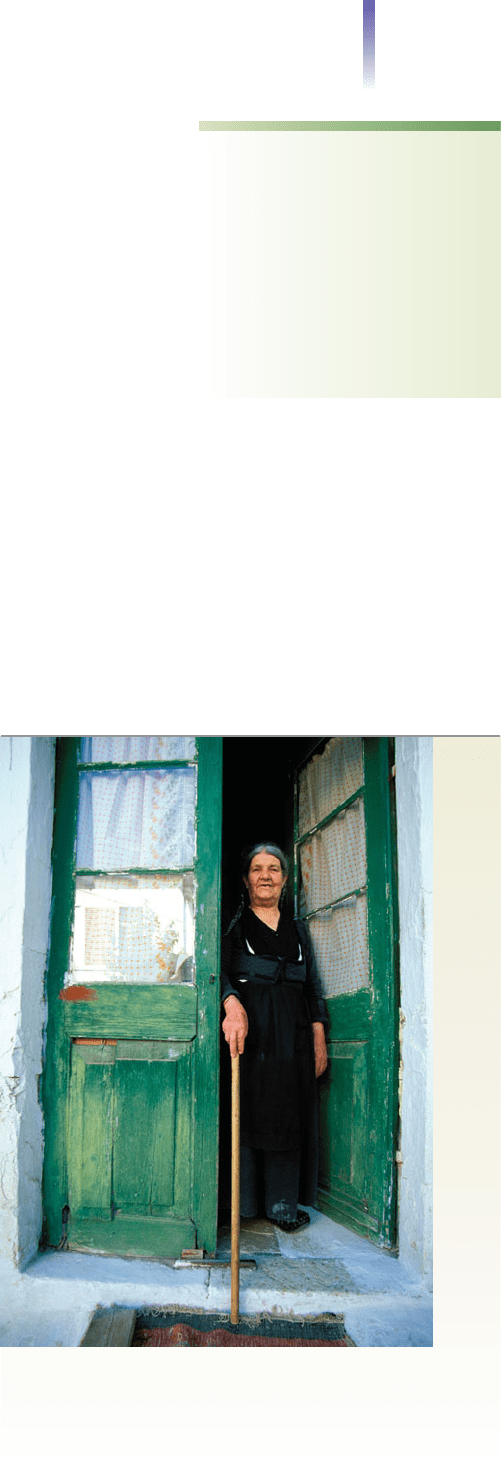
with handcuffs and a Black Maria [billy club]. Even the moderately courteous cop who hands
out the initial traffic ticket is likely to wear a gun—just in case. (Berger 1963)
The government, then, also called the state, claims a monopoly on legitimate force or vi-
olence. This point, made by Max Weber (1946, 1922/1978)—that the state claims both
the exclusive right to use violence and the right to punish everyone else who uses violence—
is crucial to our understanding of politics. If someone owes you a debt, you cannot take
the money by force, much less imprison that person. The state, in contrast, can. The ultimate
proof of the state’s authority is that you cannot kill someone because he or she has done
something that you consider absolutely horrible—but the state can. As Berger (1963) sum-
marized this matter, “Violence is the ultimate foundation of any political order.”
Before we explore the origins of the modern state, let’s first look at a situation in which
the state loses legitimacy.
The Collapse of Authority. Sometimes the state oppresses its people, and they resist
their government just as they do a mugger. The people cooperate reluctantly—with a
smile if that is what is required—while they eye the gun in the hand of the government’s
representatives. But, as they do with a mugger, when they get the chance, they take up
arms to free themselves. Revolution, armed resistance with the intent to overthrow and
replace a government, is not only a people’s rejection of a government’s claim to rule over
them but also their rejection of its monopoly on violence. In a revolution, people assert
that right for themselves. If successful, they establish a new state in which they claim the
right to monopolize violence.
What some see as coercion, however, others see as authority. Consequently, while some
people are ready to take up arms against a government, others remain loyal to it, willingly
defend it, and perhaps even die for it. The more that its power is
seen as legitimate, then, the more stable a government is.
But just why do people accept power as legitimate? Max Weber
(1922/1978) identified three sources of authority: traditional,
rational–legal, and charismatic. Let’s examine each.
Traditional Authority
Throughout history, the most common basis for authority has
been tradition. Traditional authority, which is based on custom,
is the hallmark of tribal groups. In these societies, custom dictates
basic relationships. For example, birth into a particular family
makes an individual the chief, king, or queen. As far as members
of that society are concerned, this is the right way to determine
who shall rule because “We’ve always done it this way.”
Gender relations often open a window on traditional author-
ity. For example, as shown in the photo to the right, in the vil-
lages around the Mediterranean, widows were expected to wear
only black until they remarried. This generally meant that they
wore black for the rest of their lives. By law, a widow was free to
wear any color she wanted to, but custom dictated otherwise.
Tradition was so strong that if a widow violated this dress code
by wearing a color other than black, she was perceived as having
profaned the memory of her deceased husband and was ostra-
cized by the community.
When a traditional society industrializes, its transformation
undermines traditional authority. Social change brings with it new
experiences. This opens up new perspectives on life, and no longer
does traditional authority go unchallenged. In some villages of
Italy, for example, you can still see old women dressed in black
from head to toe—and you immediately know their marital status.
Younger widows, however, are likely to be indistinguishable from
other women.
Power,Authority, and Violence 433
state a political entity that
claims monopoly on the use of
violence in some particular ter-
ritory; commonly known as a
country
revolution armed resistance
designed to overthrow and
replace a government
traditional authority
authority based on custom
For centuries, widows in Mediterranean countries, such as
this widow in Italy, were expected to dress in black and to
mourn for their husbands the rest of their lives. Widows
conformed to this expression of lifetime sorrow not because
of law, but because of custom. As industrialization erodes
traditional authority, fewer widows follow this practice.
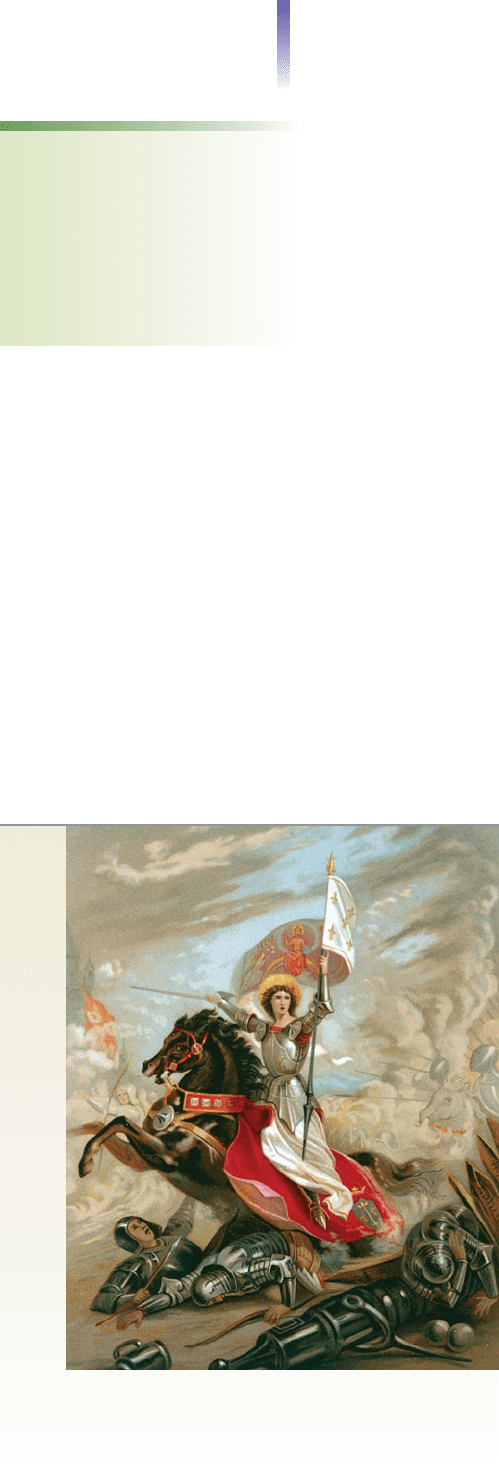
Although traditional authority declines with industrialization, it never dies out. Even
though we live in a postindustrial society, parents continue to exercise authority over their
children because parents always have had such authority. From generations past, we inherit
the idea that parents should discipline their children, choose their children’s doctors and
schools, and teach their children religion and morality.
Rational–Legal Authority
The second type of authority, rational–legal authority, is based not on custom but on
written rules. Rational means reasonable, and legal means part of law. Thus rational–legal
refers to matters that have been agreed to by reasonable people and written into law (or
regulations of some sort). The matters that are agreed to may be as broad as a constitu-
tion that specifies the rights of all members of a society or as narrow as a contract be-
tween two individuals. Because bureaucracies are based on written rules, rational–legal
authority is sometimes called bureaucratic authority.
Rational–legal authority comes from the position that someone holds, not from the
person who holds that position. In the United States, for example, the president’s author-
ity comes from the legal power assigned to that office, as specified in a written constitu-
tion, not from custom or the individual’s personal characteristics. In rational–legal
authority, everyone—no matter how high the office held—is subject to the organization’s
written rules. In governments based on traditional authority, the ruler’s word may be law;
but in those based on rational–legal authority, the ruler’s word is subject to the law.
Charismatic Authority
A few centuries back, in 1429, the English controlled large parts of France. When they prevented
the coronation of a new French king, a farmer’s daughter heard a voice telling her that God had
a special assignment for her—that she should put on men’s clothing, recruit an army, and go
to war against the English. Inspired, Joan of Arc raised an army, conquered cities, and defeated
the English. Later that year, her visions were fulfilled as she stood next to
Charles VII while he was crowned king of France. (Bridgwater 1953)
Joan of Arc is an example of charismatic authority, the third type of
authority Weber identified. (Charisma is a Greek word that means a
gift freely and graciously given [Arndt and Gingrich 1957].) People
are drawn to a charismatic individual because they believe that indi-
vidual has been touched by God or has been endowed by nature with
exceptional qualities (Lipset 1993). The armies did not follow Joan
of Arc because it was the custom to do so, as in traditional authority.
Nor did they risk their lives alongside her because she held a position
defined by written rules, as in rational–legal authority. Instead, peo-
ple followed her because they were attracted by her outstanding traits.
They saw her as a messenger of God, fighting on the side of justice,
and they accepted her leadership because of these appealing qualities.
The Threat Posed by Charismatic Leaders. Kings and queens
owe allegiance to tradition, and presidents to written laws. To
what, however, do charismatic leaders owe allegiance? Their au-
thority resides in their ability to attract followers, which is often
based on their sense of a special mission or calling. Not tied to tra-
dition or the regulation of law, charismatic leaders pose a threat to
the established political order. Following their personal inclina-
tion, charismatic leaders can inspire followers to disregard—or
even to overthrow—traditional and rational–legal authorities.
This threat does not go unnoticed, and traditional and rational–
legal authorities often oppose charismatic leaders. If they are not
careful, however, their opposition may arouse even more positive
sentiment in favor of the charismatic leader, who might be viewed
434 Chapter 15 POLITICS
rational–legal authority
authority based on law or writ-
ten rules and regulations; also
called bureaucratic authority
charismatic authority
authority based on an individ-
ual’s outstanding traits, which
attract followers
One of the best examples of charismatic authority is Joan
of Arc. Uncomfortable at portraying Joan of Arc wearing
only a man’s coat of armor, the artist had made certain
she is wearing plenty of makeup, and also has added a
ludicrous skirt.

as an underdog persecuted by the powerful. Occasionally the
Roman Catholic Church faces such a threat, as when a priest claims
miraculous powers that appear to be accompanied by amazing heal-
ings. As people flock to this individual, they bypass parish priests
and the formal ecclesiastical structure. This transfer of allegiance
from the organization to an individual threatens the church hierar-
chy. Consequently, church officials may encourage the priest to
withdraw from the public eye, perhaps to a monastery, to rethink
matters. This defuses the threat, reasserts rational–legal authority,
and maintains the stability of the organization.
Authority as Ideal Type
Weber’s classifications—traditional, rational–legal, and charismatic—
represent ideal types of authority. As noted on pages 179–180, ideal
type does not refer to what is ideal or desirable, but to a composite
of characteristics found in many real-life examples. A particular
leader, then, may show a combination of characteristics.
An example is John F. Kennedy, who combined rational–legal
and charismatic authority. As the elected head of the U.S. govern-
ment, Kennedy represented rational–legal authority. Yet his mass
appeal was so great that his public speeches aroused large numbers
of people to action. When in his inaugural address Kennedy said,
“Ask not what your country can do for you; ask what you can do for
your country,” millions of Americans were touched. When Kennedy
proposed a Peace Corps to help poorer countries, thousands of ide-
alistic young people volunteered for challenging foreign service.
Charismatic and traditional authority can also overlap. The
Ayatollah Khomeini of Iran, for example, was a religious leader,
holding the traditional position of ayatollah. His embodiment of the Iranian people’s
dreams, however, as well as his austere life and devotion to principles of the Koran, gave
him such mass appeal that he was also a charismatic leader. Khomeini’s followers were
convinced that God had chosen him, and his speeches could arouse tens of thousands of
followers to action.
In rare instances, then, traditional and rational–legal leaders possess charismatic traits.
This is unusual, however, and most authority is clearly one type or another.
The Transfer of Authority
The orderly transfer of authority from one leader to another is crucial for social stability.
Under traditional authority, people know who is next in line. Under rational–legal author-
ity, people might not know who the next leader will be, but they do know how that person
will be selected. South Africa provides a remarkable example of the orderly transfer of au-
thority under a rational–legal organization. This country had been ripped apart by decades
of racial–ethnic strife, including horrible killings committed by each side. Yet, by maintain-
ing its rational–legal authority, the country was able to transfer power peacefully from the
dominant group led by President de Klerk to the minority group led by Nelson Mandela.
Charismatic authority has no rules of succession, making it less stable than either tra-
ditional or rational–legal authority. Because charismatic authority is built around a sin-
gle individual, the death or incapacitation of a charismatic leader can mean a bitter
struggle for succession. To avoid this, some charismatic leaders make arrangements for
an orderly transition of power by appointing a successor. This step does not guarantee
orderly succession, of course, for the followers may not have the same confidence in the
designated heir as did the charismatic leader. A second strategy is for the charismatic leader
to build an organization. As the organization develops rules or regulations, it transforms
itself into a rational–legal organization. Weber used the term the routinization of
charisma to refer to the transition of authority from a charismatic leader to either tradi-
tional or rational–legal authority.
Power,Authority, and Violence 435
routinization of charisma
the transfer of authority from a
charismatic figure to either a
traditional or a rational–legal
form of authority
Charismatic authorities can be of any morality, from the
saintly to the most bitterly evil. Like Joan of Arc, Adolf
Hitler attracted throngs of people, providing the stuff of
dreams and arousing them from disillusionment to hope.
This poster from the 1930s, titled Es Lebe Deutschland
(“Long Live Germany”), illustrates the qualities of
leadership that Germans of that period saw in Hitler.
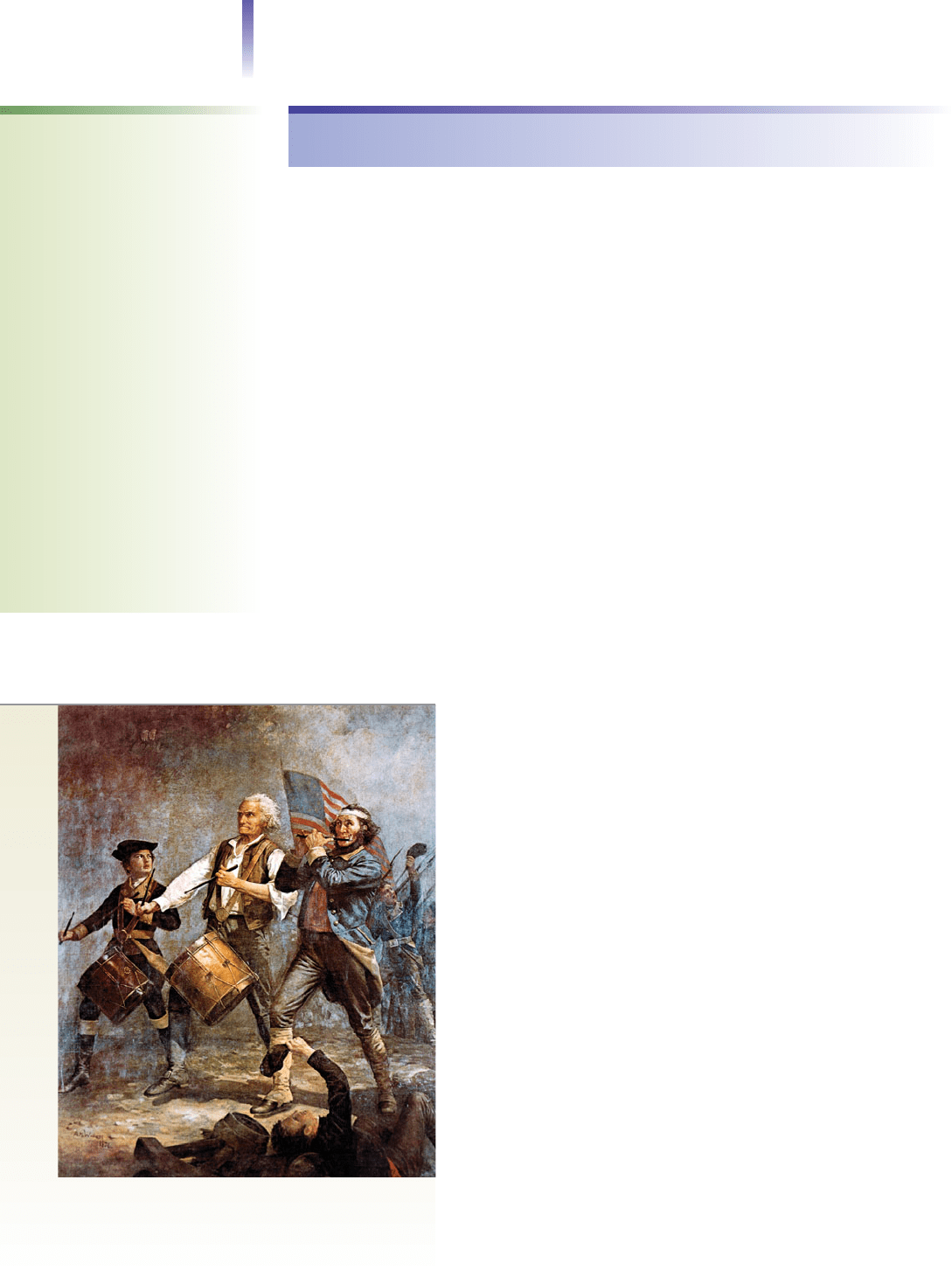
Types of Government
How do the various types of government—monarchies, democracies, dictatorships, and
oligarchies—differ? As we compare them, let’s also look at how the state arose and why
the concept of citizenship was revolutionary.
Monarchies: The Rise of the State
Early societies were small and needed no extensive political system. They operated
more like an extended family. As surpluses developed and societies grew larger, cities
evolved—perhaps around 3500
B.C. (Fischer 1976). City-states then came into being,
with power radiating outward from the city like a spider’s web. Although the ruler of
each city controlled the immediate surrounding area, the land between cities remained
in dispute. Each city-state had its own monarchy, a king or queen whose right to rule
was passed on to the monarch’s children. If you drive through Spain, France, or Ger-
many, you can still see evidence of former city-states. In the countryside, you will see
only scattered villages. Farther on, your eye will be drawn to the outline of a castle on
a faraway hill. As you get closer, you will see that the castle is surrounded by a city. Sev-
eral miles farther, you will see another city, also dominated by a castle. Each city, with
its castle, was once a center of power.
City-states often quarreled, and wars were common. The victors extended their rule,
and eventually a single city-state was able to wield power over an entire region. As the size
of these regions grew, the people slowly began to identify with the larger region. That is,
they began to see distant inhabitants as “we” instead of “they.” What we call the state—
the political entity that claims a monopoly on the use of violence within a territory—
came into being.
Democracies: Citizenship
as a Revolutionary Idea
The United States had no city-states. Each colony, however, was small
and independent like a city-state. After the American Revolution,
the colonies united. With the greater strength and resources that
came from political unity, they conquered almost all of North
America, bringing it under the power of a central government.
The government formed in this new country was called a
democracy. (Derived from two Greek words—demos [common
people] and kratos [power]—democracy literally means “power to
the people.”) Because of the bitter antagonisms associated with the
revolution against the British king, the founders of the new coun-
try were distrustful of monarchies. They wanted to put political
decisions into the hands of the people.
This was not the first democracy the world had seen, but such
a system had been tried before only with smaller groups. Athens,
a city-state of Greece, practiced democracy 2,500 years ago, with
each free male above a certain age having the right to be heard and
to vote. Members of some Native American tribes, such as the Iro-
quois, also elected their chiefs, and in some, women were able to
vote and to hold the off ice of chief. (The Incas and Aztecs of Mexico
and Central America had monarchies.)
Because of their small size, tribes and cities were able to practice
direct democracy. That is, they were small enough for the eligible
voters to meet together, express their opinions, and then vote pub-
licly—much like a town hall meeting today. As populous and spread
out as the United States was, however, direct democracy was im-
possible, and the founders invented representative democracy.
436 Chapter 15 POLITICS
city-state an independent
city whose power radiates out-
ward, bringing the adjacent
area under its rule
monarchy a form of govern-
ment headed by a king or
queen
democracy a government
whose authority comes from
the people; the term, based on
two Greek words, translates lit-
erally as “power to the people”
direct democracy a form of
democracy in which the eligible
voters meet together to
discuss issues and make their
decisions
representative democracy
a form of democracy in which
voters elect representatives to
meet together to discuss issues
and make decisions on their
behalf
This classic painting by Archibald Willard,“Spirit of ’76,”
depicts a generic scene from the War of Independence,
which allowed the U.S. experiment with democracy to
proceed. In this war, drummers and fifers actually led
some charges. And young boys were some of the
drummers.
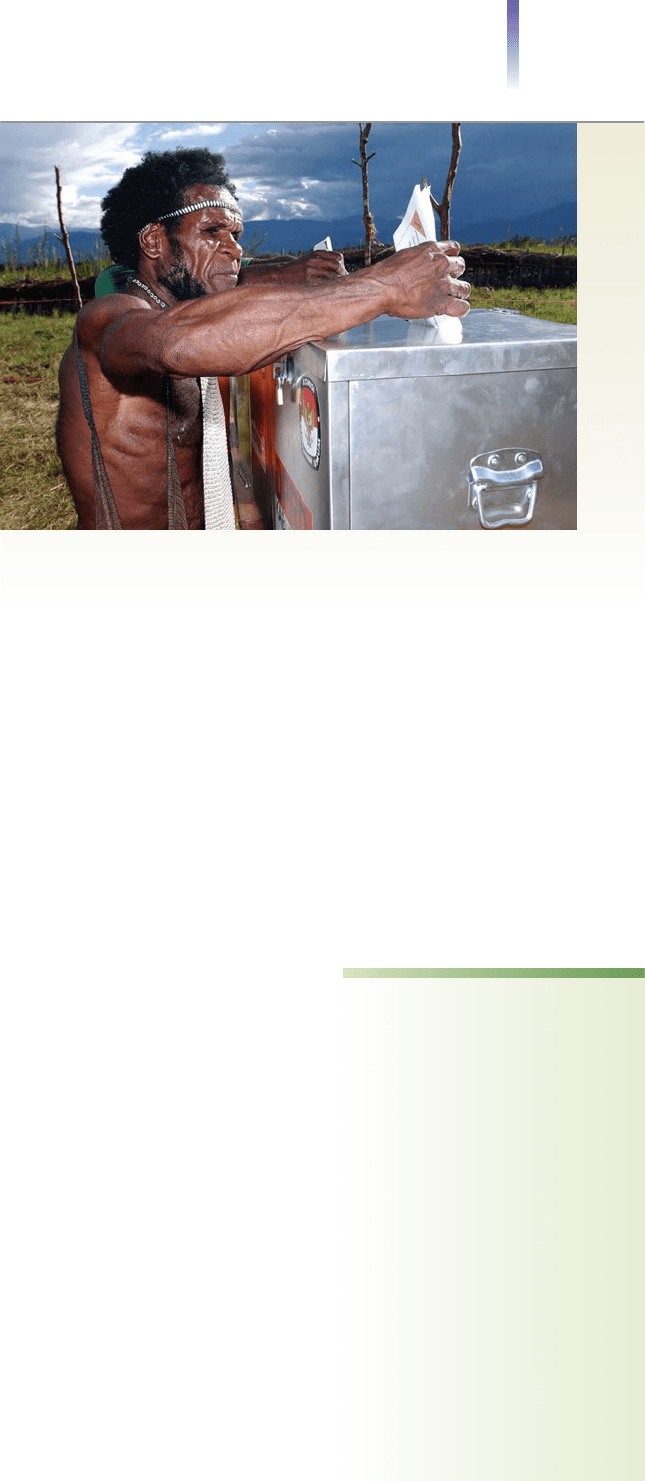
Certain citizens (at first only white male landown-
ers) voted for men to represent them in Washing-
ton. Later, the vote was extended to men who
didn’t own property, to African American men,
and, finally, to women. The Internet could fur-
ther increase voter participation and even allow
direct democracy to develop, issues explored in
the Mass Media box on the next page.
Today we take the concept of citizenship for
granted. What is not evident to us is that this idea
had to be envisioned in the first place. There is
nothing natural about citizenship; it is simply one
way in which people choose to define themselves.
Throughout most of human history, people were
thought to belong to a clan, to a tribe, or even to
a ruler. The idea of citizenship—that by virtue of
birth and residence people have basic rights—is
quite new to the human scene.
The concept of representative democracy based
on citizenship—perhaps the greatest gift the
United States has given to the world—was revo-
lutionary. Power was to be vested in the people
themselves, and government was to flow from the people. That this concept was revolu-
tionary is generally forgotten, but its implementation meant the reversal of traditional ideas.
It made the government responsive to the people’s will, not the people responsive to the govern-
ment’s will. To keep the government responsive to the needs of its citizens, people were ex-
pected to express dissent. In a widely quoted statement, Thomas Jefferson observed that
A little rebellion now and then is a good thing. . . . It is a medicine necessary for the sound
health of government. . . . God forbid that we should ever be twenty years without such a
rebellion. . . . The tree of liberty must be refreshed from time to time with the blood of pa-
triots and tyrants. (In Hellinger and Judd 1991)
The idea of universal citizenship—of everyone having the same basic rights by virtue
of being born in a country (or by immigrating and becoming a naturalized citizen)—flow-
ered slowly, and came into practice only through fierce struggle. When the United States
was founded, for example, this idea was still in its infancy. Today, it seems inconceivable to
Americans that sex or race–ethnicity should be the basis for denying anyone the right to
vote, hold office, make a contract, testify in court, or own property. For earlier generations
of property-owning white American men, however, it seemed just as inconceivable that
women, racial–ethnic minorities, and the poor should be allowed such rights.
Over the years, then, rights have been extended, and in the United States citizenship and
its privileges now apply to all. No longer do sex, race–ethnicity, or owning property deter-
mine the right to vote, testify in court, and so on. These characteristics, however, do in-
fluence whether one votes, as we shall see in a later section on voting patterns.
Dictatorships and Oligarchies: The Seizure of Power
If an individual seizes power and then dictates his will to the people, the government is
known as a dictatorship. If a small group seizes power, the government is called an
oligarchy. The occasional coups in Central and South America and Africa, in which mil-
itary leaders seize control of a country, are often oligarchies. Although one individual may
be named president, often it is military officers, working behind the scenes, who make the
decisions. If their designated president becomes uncooperative, they remove him from
office and appoint another.
Monarchies, dictatorships, and oligarchies vary in the amount of control they wield over
their citizens. Totalitarianism is almost total control of a people by the government. In Nazi
Types of Government 437
Democracy (or “democratization”) is a global social movement. People all over
the world yearn for the freedoms that are taken for granted in the Western
democracies. Shown here is a man in a remote village in Indonesia, where
democracy has gained a foothold.
citizenship the concept that
birth (and residence or natu-
ralization) in a country imparts
basic rights
universal citizenship the
idea that everyone has the
same basic rights by virtue of
being born in a country (or by
immigrating and becoming a
naturalized citizen)
dictatorship a form of gov-
ernment in which an individual
has seized power
oligarchy a form of govern-
ment in which a small group of
individuals holds power; the
rule of the many by the few
totalitarianism a form of
government that exerts almost
total control over people
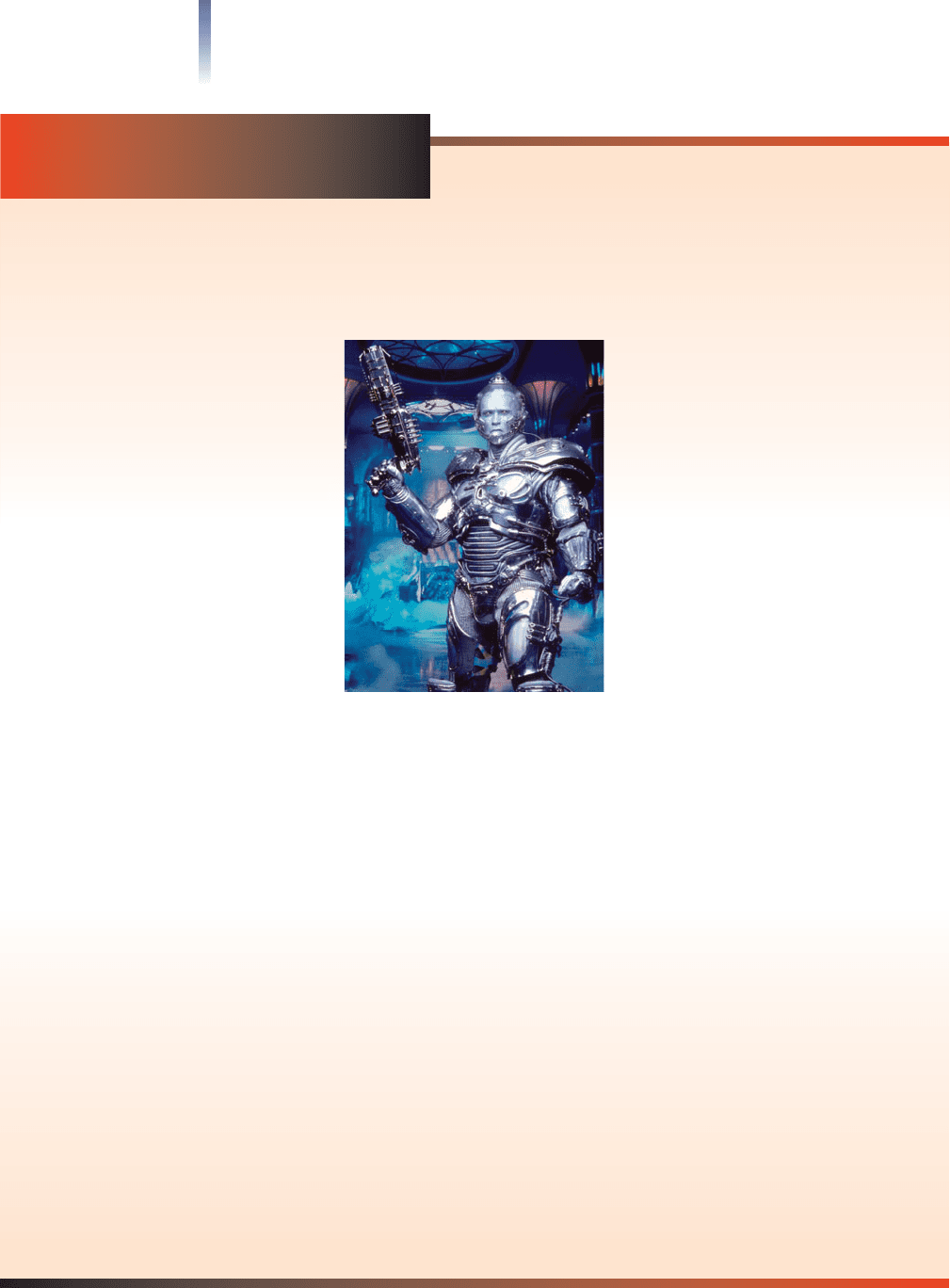
438 Chapter 15 POLITICS
Politics and Democracy: The
Promise and Threat of the
Internet
“Politics is just like show business.”
—Ronald Reagan
The Internet holds tremendous prom-
ise for democracy, but does it also pose
a threat to democracy? Let’s first con-
sider its advantages for politics.
Politicians find the Internet to be a
powerful tool. Candidates set up Web
sites, state their position on issues, and
send newsletters to hundreds of thou-
sands of supporters. Through their
home pages, blogs, and lists of online
contacts, they also organize their sup-
porters and raise funds for their cause.
The Internet is also a powerful tool
for citizens. Blogs, online petitions, and
other expressions of political sentiment
don’t go unnoticed. Even Chinese lead-
ers listen to the opinions that their
people express on Web sites. When of-
ficials in China were deciding whether
to award a Japanese company a con-
tract to build a bullet train between
Beijing and Shanghai, there was an on-
line outpouring of resentment against the Japanese for
not atoning for their war crimes in China. Communist
officials dropped Japan from consideration.
The Internet’s potential for politics is so powerful
that it could even transform the way we vote and pass
laws.“Televoting” could even replace our representa-
tional democracy with a form of direct democracy.
No longer would we have to travel to polling places in
rain and snow. More people would probably vote, for
they could cast their ballots from the comfort of their
own living rooms and offices. For many matters, the
Internet might even allow us to bypass politicians en-
tirely. Online, we could decide issues that politicians
now resolve for us.
With these potential benefits, how could the new
technology pose a threat to democracy?
Some fear that the Internet isn’t safe for voting. With
no poll watchers, how would threats, promises, or gifts
in return for votes be detected? There is also the threat
of hackers, so proficient that they even find ways to
break into “secure” financial and government sites. Pro-
ponents counter with a litany of the
shortcomings of other voting meth-
ods—that ballot boxes can be stuffed
and that electronic voting machines can
be rigged with chips to redistribute
votes already cast (Duffy 2006).
Others raise a more fundamental
issue: Direct democracy could become
a detour around the U.S. Constitution’s
system of checks and balances, which
was designed to safeguard us from the
“tyranny of the majority.” To determine
from a poll that 51 percent of adults
hold a certain opinion on an issue is
one thing—that information can guide
our leaders. But to have 51 percent of
televoters determine a law is not the
same as having elected representatives
argue the merits of a proposal in public
and then try to balance the interests of
the many groups that make up their
constituency.
Others counter this argument, saying
that before people televote, the merits
of a proposal would be debated vigor-
ously in newspapers, on radio and television, and on the
Internet itself. Voters would certainly be no less informed
than they now are. As far as balancing interest groups is
concerned, that would take care of itself, for people from
all interest groups would participate in televoting.
For Your Consideration
Do you think that direct democracy would be superior to
representative democracy? How about the issue of the
“tyranny of the majority”? (This means that the interests
of smaller groups—whether defined by race–ethnicity, re-
gion, or any other factor—are overwhelmed by the voting
power of the majority.) How can we use the mass media
and the Internet to improve government?
Sources: Diamond and Silverman 1995; Hutzler 2004; Duffy 2006; Seib
and Harwood 2008.
Under its constitutional system, the
United States is remarkably stable: Power
is transferred peacefully—even when
someone of an unusual background wins
an election. Arnold Schwarzenegger,
shown here is his role in Batman and
Robin, was elected and reelected gover-
nor of California.
MASS MEDIA In
SOCIAL LIFE
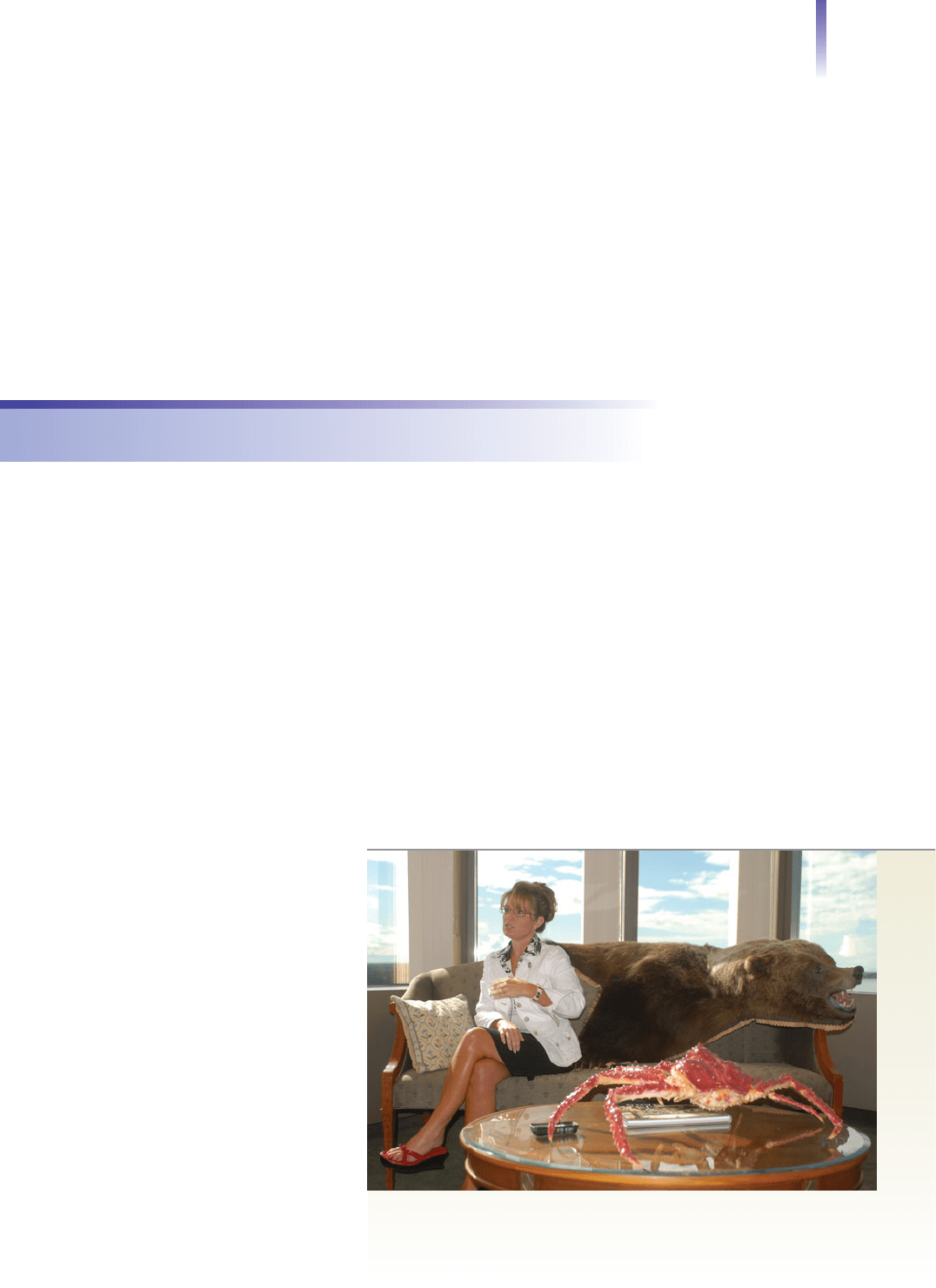
Germany, Hitler organized a ruthless secret police force, the Gestapo, which searched for
any sign of dissent. Spies even watched how moviegoers reacted to newsreels, reporting
those who did not respond “appropriately” (Hippler 1987). Saddam Hussein acted just as
ruthlessly toward Iraqis. The lucky ones who opposed Hussein were shot; the unlucky ones
had their eyes gouged out, were bled to death, or were buried alive (Amnesty International
2005). The punishment for telling a joke about Hussein was to have your tongue cut out.
People around the world find great appeal in the freedom that is inherent in citizenship
and representative democracy. Those who have no say in their government’s decisions, or
who face prison or even death for expressing dissent, find in these ideas the hope for a brighter
future. With today’s electronic communications, people no longer remain ignorant of whether
they are more or less politically privileged than others. This knowledge produces pressure for
greater citizen participation in government—and for governments to respond to their citizens’
concerns. As electronic communications develop further, this pressure will increase.
The U.S. Political System
With this global background, let’s examine the U.S. political system. We shall consider the
two major political parties, compare the U.S. political system with other democratic sys-
tems, and examine voting patterns and the role of lobbyists and PACs.
Political Parties and Elections
After the founding of the United States, numerous political parties emerged. By the time
of the Civil War, however, two parties dominated U.S. politics: the Democrats, who in
the public mind are associated with the working class, and the Republicans, who are as-
sociated with wealthier people (Burnham 1983). In pre-elections, called primaries, the
voters decide who will represent their party. The candidates chosen by each party then
campaign, trying to appeal to the most voters. The Social Map on the next page shows
how Americans align themselves with political parties.
Although the Democrats and Republicans represent somewhat different philosophical
principles, each party represents slightly different slices from the center, making it difficult to
distinguish a conservative Democrat from a liberal Republican. The extremes are easy to dis-
cern, however. Deeply committed Democrats support legislation that transfers income from
those who are richer to those who are poorer or that controls wages, working conditions, and
competition. Deeply committed Republicans, in
contrast, oppose such legislation.
Those who are elected to Congress may cross
party lines. That is, some Democrats vote for leg-
islation proposed by Republicans, and vice versa.
This happens because officeholders support their
party’s philosophy, but not necessarily its specific
proposals. When it comes to a particular bill, such
as raising the minimum wage, some conservative
Democrats may view the measure as unfair to
small employers and vote with the Republicans
against the bill. At the same time, liberal Repub-
licans—feeling that the proposal is just, or sensing
a dominant sentiment in voters back home—may
side with its Democratic backers.
Regardless of their differences and their
public quarrels, the Democrats and Republicans
represent different slices of the center. Although
each party may ridicule the opposing party and
promote different legislation—and they do fight
hard battles—they both firmly support such
fundamentals of U.S. political philosophy as free
The U.S. Political System 439
The Democrats and the Republicans represent slightly different slices of the
political center. Yet some candidates arouse extremes of ire and admiration, as
did vice-presidential candidate Sarah Palin. Palin is shown here in her governor’s
office in Anchorage, Alaska.The decoration on her couch indicates one of the
reasons for the emotions she aroused.
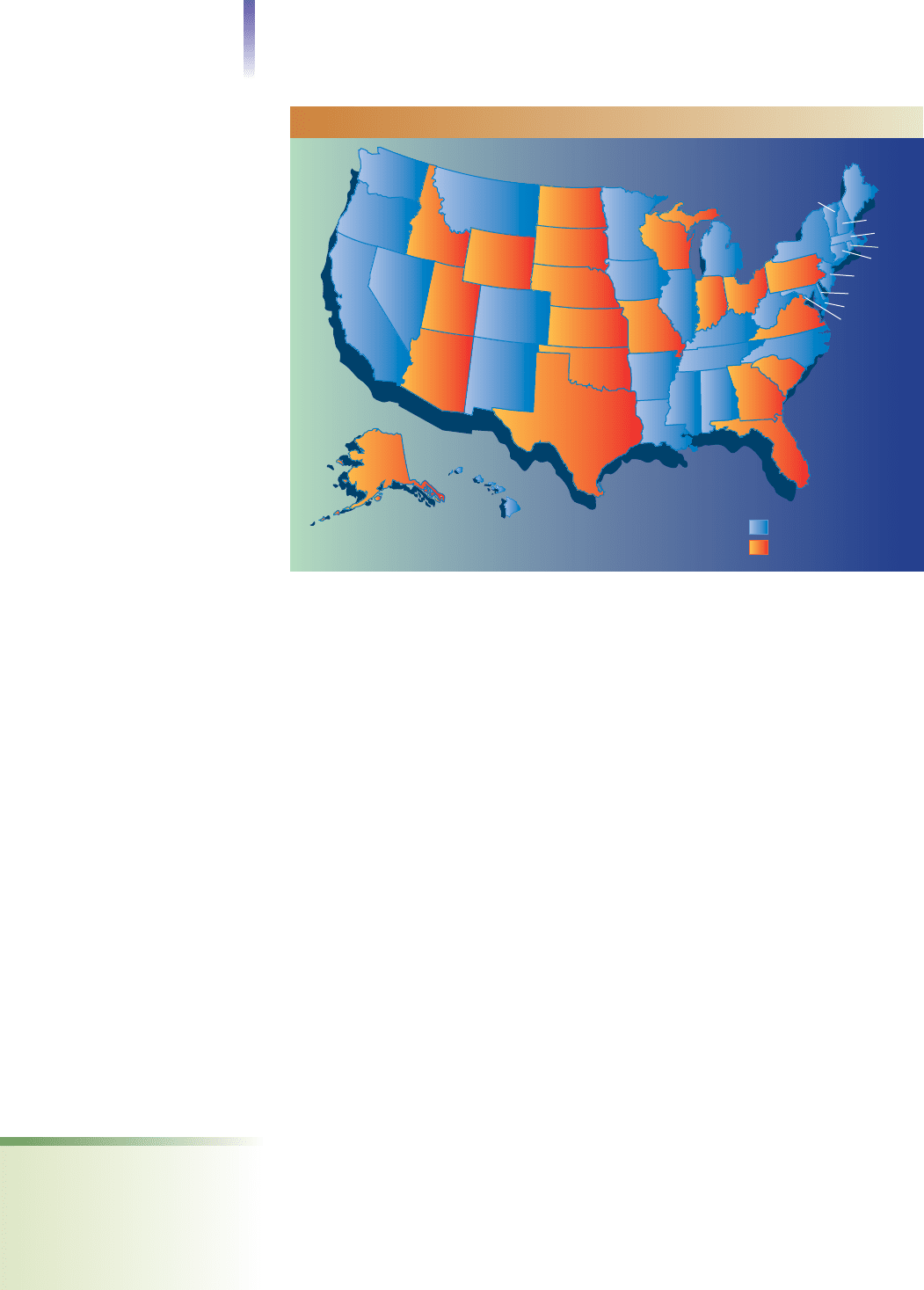
public education; a strong military; freedom of religion, speech, and assembly; and, of
course, capitalism—especially the private ownership of property.
Third parties sometimes play a role in U.S. politics, but to gain power, they must also
support these centrist themes. Any party that advocates radical change is doomed to a
short life. Because most Americans consider a vote for a third party a waste, third parties
do notoriously poorly at the polls. Two exceptions are the Bull Moose party, whose can-
didate, Theodore Roosevelt, won more votes in 1912 than Robert Taft, the Republican
presidential candidate, and the United We Stand (Reform) party, founded by billionaire
Ross Perot, which won 19 percent of the vote in 1992. Amidst internal bickering, the
Reform Party declined rapidly, dropping to 8 percent of the presidential vote in 1996, and
then off the political map (Bridgwater 1953; Statistical Abstract 1995:Table 437; 2011:
Table 396).
Contrast with Democratic Systems in Europe
We tend to take our political system for granted and to assume that any other democracy
looks like ours—even down to having two major parties. Such is not the case. To gain a
comparative understanding, let’s look at the European system.
Although both their system and ours are democracies, there are fundamental distinctions
between the two (Lind 1995). First, elections in most of Europe are not winner-take-all. In
the United States, a simple majority determines an election. For example, if a Democrat
wins 51 percent of the votes cast in an electoral district, he or she takes office. The
Republican candidate, who may have won 49 percent, loses everything. Most European
countries, in contrast, base their elections on a system of proportional representation; that
is, the seats in the legislature are divided according to the proportion of votes that each party
receives. If one party wins 51 percent of the vote, for example, that party is awarded 51 per-
cent of the seats; while a party with 49 percent of the votes receives 49 percent of the seats.
440 Chapter 15 POLITICS
proportional representa-
tion an electoral system in
which seats in a legislature are
divided according to the pro-
portion of votes that each po-
litical party receives
Democrat States
Republican States
AK
SC
NC
VA
WA
OR
CA
NV
ID
MT
WY
AZ
NM
CO
ND
SD
NE
KS
OK
TX
MN
IA
MO
AR
LA
WI
IL
KY
TN
MS
AL
GA
FL
IN
MI
WV
PA
NY
ME
NH
MA
RI
CT
NJ
DE
MD
DC
HI
VT
UT
OH
FIGURE 15.1 Which Political Party Dominates?
Note: Domination by a political party does not refer to votes for president or Congress. This
social map is based on the composition of the states’ upper and lower houses. When different
parties dominate a state’s houses, the total number of legislators was used. In Nebraska, where
no parties are designated, the percentage vote for president was used.
Source: By the author. Based on Statistical Abstract of the United States 2011:Table 411.
